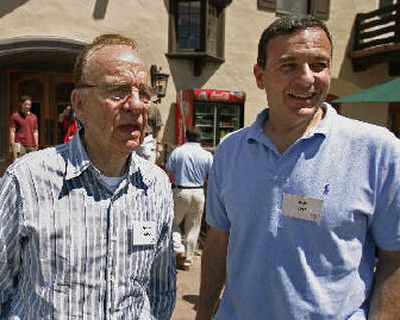Friction underlies meeting of media tycoons

It should be an idyllic setting this week when a clique of media and technology tycoons convenes for an annual retreat amid the summer splendor of Idaho’s mountains.
But the facade of tranquility will do little to conceal the friction bristling beneath the surface of the five-day summit.
The host, investment banker Herb Allen, has compiled a guest list that consists mostly of executives trying to protect their own turf while they invade new markets to reach increasingly fragmented and fickle audiences.
This high-stakes battle pits long-entrenched media like newspapers, broadcasters, movie studios and recording labels against high-tech trailblazers using the Internet to redirect the flow of information, entertainment and, ultimately, money.
Even losing early rounds in the fight can be fatal, as the recent demise of Knight Ridder Inc. demonstrated. The nation’s second-largest newspaper publisher was sold last month to McClatchy Co. after the company’s biggest shareholders expressed doubts about Knight Ridder’s ability to compete as more advertising shifts to the Web.
“I wish we had invented Google,” a despondent CEO Tony Ridder said the day before Knight Ridder faded into obsolescence.
Ridder isn’t on the guest list, but Google’s founders are. Larry Page and Sergey Brin, a pair of graduate program dropouts from Stanford University, are among the billionaires expected to attend this week’s powwow at an exclusive resort in Sun Valley, Idaho.
Just seven years after they launched Google in a Silicon Valley garage, the online search engine leader boasted $6.1 billion in revenue last year — twice that of Knight Ridder.
The yin and yang of Google and Knight Ridder is what drives the conference Allen has been hosting since 1983.
“There are most definitely old-line media companies that are closer to what Knight Ridder was doing than to Google has been doing,” said Ken Marlin, an investment banker specializing in media and technology. “If they can’t recapture some of the revenue they have been losing or find different revenue models, they are not likely to see Herb Allen’s fete five years from now.”
More than 230 movers and shakers are expected to be on hand for this year’s confab, ranging from perennials like stock market sage Warren Buffett to intriguing newcomers like 29-year-old Chad Hurley of YouTube Inc., an Internet video sharing site that has grown into a cultural phenomenon in a matter of months.
The media barons scheduled to attend include News Corp. CEO Rupert Murdoch, Time Warner Inc. CEO Richard Parsons, Walt Disney Co. CEO Robert Iger, Sony Corp. CEO Howard Stringer, Warner Music Group CEO Edgar Bronfman, DreamWorks Animation CEO Jeffrey Katzenberg, Washington Post Co. CEO Donald Graham, Reuters Group CEO Thomas Glocer and E.W. Scripps Co. CEO Kenneth Lowe.
Besides Google’s Page and Brin, the technology gurus expected to roam the resort include Yahoo Inc. CEO Terry Semel, Dell Inc. founder Michael Dell, Intel Corp. Chairman Craig Barrett, eBay Inc. CEO Meg Whitman and Amazon.com Inc. CEO Jeff Bezos.
Even as they vex the more established media, the Internet set has been scuffling among themselves, too.
Google and Yahoo have had each other in their cross hairs for the past three years. More recently, both online heavyweights have set their sights on YouTube. Meanwhile, eBay is scrambling to fend off Google’s recent threat to its online payment service, a move that has deepened the decline in the online auctioneer’s stock price.
Microsoft Corp. also figures to cast a long shadow in Idaho, although founder Bill Gates isn’t scheduled to be there as he has in past years. The world’s largest software maker will be represented by its chief research officer and the head of its entertainment and devices division instead.
The conference ostensibly mixes a little bit of business with a whole lot of pleasure. After meeting each morning, the executives spend the afternoons golfing, playing tennis, horseback riding, rafting, fishing, skeet shooting, playing bridge, practicing yoga and even ice skating.
And if they want to talk sports, Major League Commissioner Bud Selig, National Football League Commissioner Paul Tagliabue and National Basketball Association Commissioner David Stern are supposed to be there.